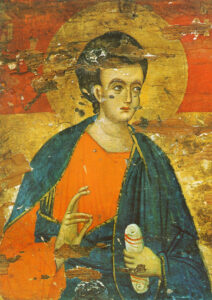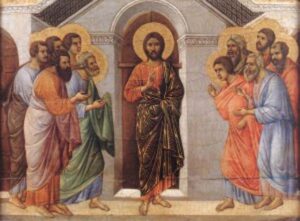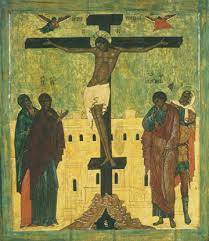Christ is risen! Truly He is risen!

Chora Church, Constantinople, 14th c (US Public Domain)
It seems strange to title this Post as I did, then follow it with “Christ is risen!” and a gorgeous Orthodox Paschal icon… and then immediately go back to Thomas and his doubts.
However, I intended to talk about doubt two weeks ago and somehow got sidetracked. Thomas has been on my mind ever since, so I hope it’s ok with you if today we do a sort of “flashback”.

from the Greek Orthodox Archdiocese
“O the beautiful [good / happy / blessed] unbelief of Thomas, which gave an unbeliever the knowledge of Christ”.
This is from one of the stichera of Great Vespers of Thomas Sunday, which I’ve seen translated in several ways. (I don’t have the original Greek. If any of you do, would you please share it with us? I’d like to know the best sense of the word.)
We can see what was beautiful and good and happy and blessed about Thomas’ doubting the Resurrection of Christ. It led to his belief and confession “You are my Lord and my God”. It had a happy ending.
Doubt
So… could anything about our own doubting somehow turn out to be blessed and good and happy and beautiful for us? That is, assuming any here present ever have doubts…
Let’s begin by asking some questions. (Be honest, now. I promise not to tell anyone.)
Have you ever have doubts?
Have you doubted God in any way? His existence? His goodness? His love?
Have you ever doubted Jesus? His Virgin Birth? His Incarnation? His Resurrection? His Presence with you now?
Do you ever doubt the Bible or anything in the Scriptures?
Do you ever doubt anything about the Church – Church teaching about something? or stories about the saints? or possibly something your bishop says, or your priest? or your favorite blogger? (In this case, I surely hope you do. Only one kind of clergy has ever claimed to be infallible, and we Orthodox very definitely doubt that!)
Our chief topic here, of course, will be “religious” doubt. But can you spare a minute or two to go secular?
Do you ever doubt what you read in the newspapers? or what we’re told in the TV news and commentary? or hear on talk radio? or read in the social media? on Facebook posts or Twitter?
So many people today believe the most absurd things for which there is no evidence. “The Pandemic isn’t real, only a cover for Bill Gates to plant micro-chips in our bodies.” (This is one of the bizarre stories currently being circulated. and some people believe it! ) Or “I believe without question what some politician and his sycophants say”, or what some self-appointed TV preacher tells us.
I’ve said this before: People, use your mind. Ask questions. Think! Please, let’s have more doubt in this world.
Enough of that. Back to the subject at hand:
Religious Doubt

If you have ever had doubts about religious matters, I want to say two things:
1 So have I. 2 Good for you!
I am not trying to plant the seeds of doubt about the Faith in you. But “blind faith” is a bad thing. I’ve said before: If you’re about to enter any religious group which wants you to “check” your mind at the door, do not go in.
Many good, decent, well-meaning people, seemingly without questioning, believe things like this:
1 That the true understanding of Christianity came from a nice New England lady in the 1860s who taught that evil and sickness and even the body aren’t real.
2 That (and let me go on about this one, because it leaves me utterly perplexed) the true Faith was revealed to one Joseph Smith in upstate New York in the 1820s by the angel Moroni (hitherto unknown) who gave him the Book of Mormon (said to be 2000 years old, but written oddly enough in King James English!) on tablets which no one except Smith saw, and were then taken into Heaven. The Book reported that after His Ascension Jesus, knowing that His appointed Apostles would get it all wrong, visited a Central American tribe (otherwise unheard of) and gave them the True Faith – and there’s much more which is far more “imaginative”, shall we say? This is the foundation of what is now the fastest growing denomination in the world. It’s members appear to be the nicest people imaginable. (Any Utah readers here, is this accurate?) But do they really believe that? Do they never ask…? Do they never doubt…?
3 Another group was founded on a prophecy that Christ would return in glory in 1914, and when He did not, it was revealed that actually He had returned – invisibly. The group continues to flourish today.
And there are many more.
Don’t be afraid of doubting.
Because, as the hymn says, doubt can be a beautiful, blessed thing. Sincere doubt can lead us deeper into truth.
 Doubt is not the same as disbelief. If Thomas had disbelieved in the Resurrection, disbelieved what the other Apostles said, he would have given up and got out of there. But Thomas doubted. He was unsure, so he stuck around, hoping to be convinced. There he was a week later, faithfully waiting, faithfully doubting – and the Risen Christ convinced him. Note: Jesus did not chastise or criticize Thomas for his doubt. Read John 20.
Doubt is not the same as disbelief. If Thomas had disbelieved in the Resurrection, disbelieved what the other Apostles said, he would have given up and got out of there. But Thomas doubted. He was unsure, so he stuck around, hoping to be convinced. There he was a week later, faithfully waiting, faithfully doubting – and the Risen Christ convinced him. Note: Jesus did not chastise or criticize Thomas for his doubt. Read John 20.
So, if you have any doubts, you are doing exactly as Thomas did. You haven’t gone away. You are still here waiting to be convinced. (I mean, why else are you reading this Blog?!) And if we are truly doubting, truly seeking, then… I’m not going to finish that sentence, for Jesus already did: “He who asks receives, and he who seeks finds, and to him who knocks it will be opened.” Matthew 7:8
My amateur analysis of Doubt
Since I haven’t found a good Orthodox book about this anywhere, this is based only on my own experience – with my own doubts, and from listening to and counseling others in Confession and conversation, and lately by email and texting. What follows is, shall we say, “preliminary” at best, so take it only for what you think it’s worth.
I think there are three kinds of doubt.
Emotional doubt is when it feels to us as if God doesn’t exist, or Jesus isn’t the Son of God, or that “when we’re dead we’re dead”, and so on.
Intellectual doubt results when we are rationally unconvinced about God or Christ or the Church or the Faith.
Experiential doubt comes when we have tried to live the Christian life, have worshiped, prayed, loved – and it doesn’t seem to be “working” for us.
I think that, after the Resurrection, poor Thomas suffered all of these.
How be Cured of Doubt
You know that I’m not an impartial observer here! I hope and pray you are a faithful Orthodox Christian, and if you’re not I want you to be. So I’m now going to attempt to show how to overcome doubt.
Emotional Doubt
I suspect this is the most common kind of doubt. Certainly it’s the most capricious, since our emotions are the least “solid” part of us. Sometimes emotions are deep-rooted, but often they come and go with the weather or what we just had to eat. I think Satan takes great delight in stirring up emotional doubt in us.
My suggestions here are based largely on my own experience, since I have always suffered from emotional doubt. Sometimes in the middle of the night, or at other odd times – in the middle of my  prayers, this morning! – it comes on me: “This can’t all be true.” This is the kind of doubt the Apostles had on Pascha night, when the risen Christ stood there before them, and their reaction was “This is impossible. It’s too good to be true.”
prayers, this morning! – it comes on me: “This can’t all be true.” This is the kind of doubt the Apostles had on Pascha night, when the risen Christ stood there before them, and their reaction was “This is impossible. It’s too good to be true.”
Here’s how I handle it: First, I say: “Satan, go to hell.” Then I think. “Look. You know how much God has done in your life. You know how often you have thought through the Faith, and you know you believe it. You know how well it has guided your life. So cut it out!” Usually my emotions settle down, and my doubt goes away quickly.
If that doesn’t do the trick for you, maybe you should imitate one my professors at Methodist seminary, a genuine Believer but who really had to fight for it. He said that most mornings he woke up as an atheist. As he took a shower he convinced himself that God exists. As he shaved he convinced himself that Jesus is the Son of God. As he ate breakfast he convinced himself that the Church is the Body of Christ. And then he went to school and sincerely taught the Christian Faith!
Intellectual Doubt
I think the cure for this is to think some more, think harder. Go to the heart of the matter.
One example: Does God exist? Really, can you even imagine that the cosmos made itself and continues to exist on its own steam? These require a Personal Creator and Sustainer.
Are the Gospels accurate and true? Don’t focus on the text. Try this: All four books, with different authors, are completely unlike all other ancient writing – unlike myth, unlike history, unlike all other biography till modern times. Why so? Read a little book Ring of Truth *: A Translator’s Testimony, by Anglican J B Phillips (not a fundamentalist) who explains why he who knows the New Testament inside and out, finds it utterly compelling.
- Don’t confuse this with another book by the same name, different author.
Is Jesus Christ really the Son of God? Did He truly rise from the dead? Is God really good? and many more questions. Use the same process on all of them – not by yourself, but guided by the Orthodox Faith, the Scriptures, the Fathers. The answers are there.
Experiential Doubt
 I think all Christians have had times when it felt as if God has gone and left us, or when we hadn’t the faintest idea what He was doing. Jesus suffered this, too. “My God, my God, why have You forsaken Me?”
I think all Christians have had times when it felt as if God has gone and left us, or when we hadn’t the faintest idea what He was doing. Jesus suffered this, too. “My God, my God, why have You forsaken Me?”
By permission of Saint Isaac’s Skete, skete.com
This is difficult to overcome, and I’m less sure how to deal with it. I think the only solution is: Like Thomas – like Jesus in the Garden and on the Cross – keep at it. Don’t give up. If God is real, if the Faith is true, then He will “show Himself” sooner or later, in this life or the next.
I have always been moved by the witness of Saint Polycarp of Smyrna, martyred about the year 150. When he was hauled into the arena and the magistrate begged him to renounce Christ, this was his very “minimal” refusal: “Eighty six years I have served Him, and He has never done me any harm. How can I abandon my Lord who has saved me?”
If I may dare add the witness of someone almost as old as Polycarp: In my experience, eventually He has always come through. And before that, along the way, trying to follow Jesus’ teachings and example has led to so much good – and kept me from doing so many stupid things! As I near the end, He Himself has set my heart and soul and mind at rest. That’s all I can say.
The Real Cure for Doubt
The cure is Nous / Νους. This is tricky to explain, especially to those who have grown up here in the Western world. English-speaking Christianity doesn’t even a word for it. Most English dictionaries translate Nous as “mind” or “reason” or something like that. Wrong!
Nous / Νους is “interior perception” or “spiritual perception”, knowledge of something which comes not chiefly from the mind or the emotions, but from deep in our soul, from the heart of our being. Mothers’ love for their children is Nous, deeper than reason or emotion can explain. Nous is the love some couples have for each other which, beyond all explanation, through thick and thin, lasts life-long. Nous explains why the martyrs were faithful to Christ, when they knew they certainly weren’t going to get anything out of it in this world. Nous explains why many people simply “love” Jesus, even when it doesn’t feel good, even when they can’t explain it rationally, even when it would be “sensible” to give Him up.
Many Western Christians experience Nous, but they don’t understand what’s going on within them. They think the Faith is grounded only in doctrine or emotion. It isn’t.
Nous is often a gift of God. But if we do not have this knowledge of God deep within us, how do we attain it?
I am now in ‘way over my head, but this is what I think:
“Behold, I stand at the door and knock. If anyone hears My voice and opens the door, I will come in to him and dine with him, and he with Me.” Revelation 3:20
Invite Him in to your heart and soul. This requires work: Pray. Pray much. Worship much. Follow His command: Love much. Read the Gospels and know them well, for He is there. And “If anyone loves Me, he will keep My word; and My Father will love him, and We will come to him and make Our home with him.” John 14:23
Holman Hunt, c 1852
Draw near to Him and, to come at it another way, I think you will find that actually He has always been with you, our Risen Lord waiting within you. And when you find Him there, then you won’t need to feel His presence. You won’t need to convince yourself of Him. You will know His presence deep in your heart and soul. That is Nous.
 And with Thomas, your beautiful, good, happy, blessed doubt will be turned into lasting Faith.
And with Thomas, your beautiful, good, happy, blessed doubt will be turned into lasting Faith.
P.S. Let me speak again for myself, very personally. In the end, if I should be wrong… For all the reasons given above I feel sure I am not, but for now there will always be that if, for “faith is the substance of things hoped for, the evidence of things not seen.” Hebrews 11:1 Even if, here’s where I am as I near the end of my life: I love Jesus. My love for Him is so deep within me, that I couldn’t “shake it”, even if I wanted to. That’s His gift to me, not my gift to Him! I’m for Him, no matter what. I feel sort of like Martin Luther on another occasion: “Here I stand. I can do no other.”
_______________________________________________
I said that this Post would be an amateur interim effort. Already I could be happier with it in places – but it’s time to get this Post out! If you have anything to add or correct or suggest, please do so below.
Next two weeks tentatively “I go to prepare a place for you.” and Saint Ephraim of Syria: Hymns on Paradise.